
As a group, Linux users tend to be more concerned with security and privacy than most computer users. While Linux-based operating systems are considered to be more secure against things like viruses and malware, that security is only one part of the picture. Even if your system is secure against threats, you still need to protect your communications with the rest of the world. This is why you need a good VPN for Linux.
We’re seeing the interest in VPNs surge for all operating systems, including Linux-based distros, in this brave new world of intense surveillance, often carried out by your own internet service provider, as well as social media sites, and who knows what other groups. The trick is to find the best VPN for Linux based on your own unique needs and circumstances.
The VPNs in the table below passed all of our tests and met the criteria to be recommended:
- NordVPN – Best overall VPN for Linux with the fastest speeds, great support for Linux, and a large network of very fast servers around the world (with a 74% off coupon)
- Surfshark – An excellent VPN for Linux with a full GUI app and lots of features (82% coupon)
- ExpressVPN – Reliable VPN for Linux
- OVPN – A good VPN for Linux with a full GUI app
No Linux VPN is perfect
As a Linux user, your choices are somewhat limited. There are fewer VPNs that support Linux than other top operating systems. And many of them provide at most minimal support, are hard to install and configure, as well as lacking some of the features that people on other operating systems enjoy.
One big pain point for using popular Linux VPNs has been their lack of a graphic user interfaces (GUI). It is definitely possible to configure and control services like NordVPN from the Linux command line interface (CLI). But it is a grand pain in the neck and not exactly user-friendly. Happily, this is starting to change.
As you’ll see in the following mini-reviews, Two of the VPNs listed here have some form of Linux GUI. They may not have all the features implemented yet, and may only work on certain Linux distros, but this is definitely progress.
How this guide can help
In this Linux VPN guide, we’ve singled out what we consider to be the four best VPNs for Linux users. While they are all different, our testing has shown that they reliably provide strong security and excellent privacy protection.
Note: As a Linux user, you are probably used to doing at least some of your work in the terminal. That’s good because Linux VPNs don’t come with the kind of simple installers that Windows or Mac users enjoy. You’ll need to be willing and able to use the command line to install and configure any of these top Linux VPNs.
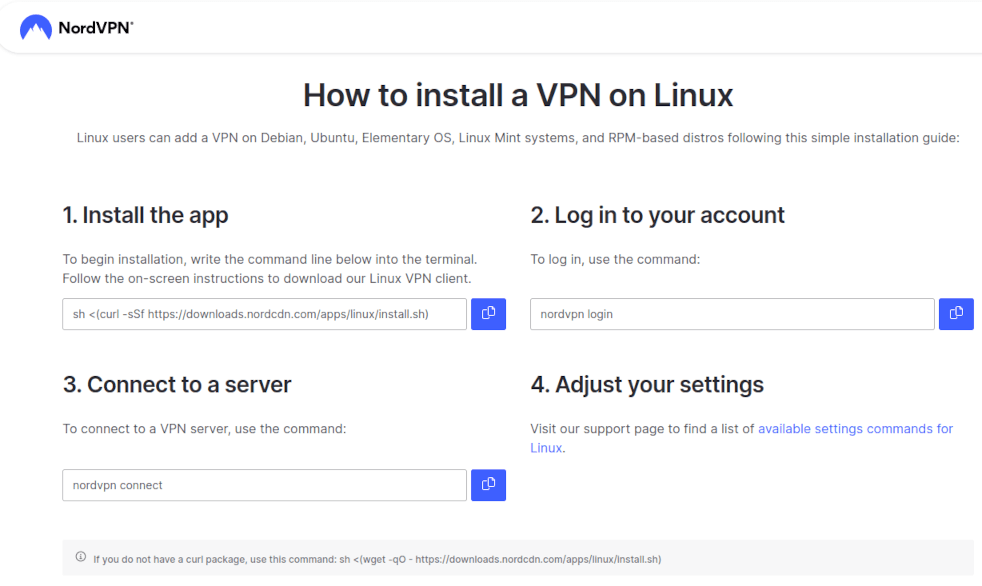
to install a Linux VPN.
Selecting the best VPN for Linux
Before we jump into the recommendations, let’s first cover the criteria we used for choosing the best Linux VPNs. Each one had to meet the following criteria:
- Passed all tests with no data leaks found (no IP address leaks or DNS leaks)
- Good performance throughout the server network (speed and reliability)
- Supports the OpenVPN protocol and strong encryption standards (WireGuard support is a big plus as well)
- Offers a money-back guarantee
- Trustworthy and well-established VPN provider with a good track record
- Located in a safe privacy jurisdiction (outside of Five Eyes countries, such as the US and UK) to keep your data safe
Given the varying capabilities of these VPNs, you really need to think about which will be best for your own situation. About the only thing they all have in common is that they all support Linux. We recommend you figure out which features are the most important to you, then read through all the mini-reviews and look for the service that is the best fit for your needs.
With all that said, here are our contenders for the title of the best VPN for Linux:
NordVPN – Best all-around VPN for Linux
| Website | NordVPN.com |
| Based in | Panama |
| Logs | No logs (audited) |
| Price | $2.99/mo. |
| Support | 24/7 live chat |
| Refund | 30 days |
| Deal | 74% Off Coupon |
We’ve been writing about VPN services for years, and have long been impressed by NordVPN. They innovate hard, have a huge, huge network of VPN servers, and rank at or near the top in almost every category.
NordVPN delivers excellent security and privacy through solid apps that run on all the most popular devices. Their security uses an AES-256 cipher with HMAC SHA256 hash authentication, and DHE-4096 key exchange for Perfect Forward Secrecy (PFS). You get your choice of VPN protocols, including the industry-standard OpenVPN, and the WireGuard VPN protocol.
NordVPN is a verified no logs VPN, having passed four third-party audits of their logging policies at the time of this update. Furthermore, NordVPN runs all servers in RAM-only mode, without hard drives. This ensures no data can be stored on a VPN server and seized by third parties.
WireGuard yields impressive performance
By itself, the WireGuard protocol is extremely fast and secure, but maintains a copy of each user’s IP address while they are connected. To eliminate this problem, NordVPN created the NordLynx VPN protocol which uses a double NAT system and makes WireGuard suitable for a no logs VPN.
With this issue resolved, NordVPN consistently outperforms other VPNs. In our recent NordVPN vs ExpressVPN comparison, NordVPN was able to hit speeds of 755 Mbps with servers in the US. This makes it a great choice for any high-bandwidth activities, such as using a VPN for torrenting.

On the innovation front, the service includes specialized features like Double VPN and Onion over VPN servers. Their Obfuscated servers disguise the fact that you are using a VPN for even more privacy, such as when you need to use the VPN in countries that normally block such services. They also offer Dedicated IP servers, which give you a static IP address that is not shared with anyone else.
Then there is Threat Protection, a feature that blocks ads, stops trackers dead, and prevents connections from malware domains. It can also scan downloaded documents for malicious code, and protect all traffic on your device even when you are not connected to a VPN server.
See all NordVPN features here >>
The NordVPN Linux app functions great, with no leaks or bugs whether we were testing their older OpenVPN protocol or the new NordLynx protocol. The one drawback to this app from our perspective is that it is CLI only, so if you want or need a GUI interface NordVPN is not the right Linux VPN for you.
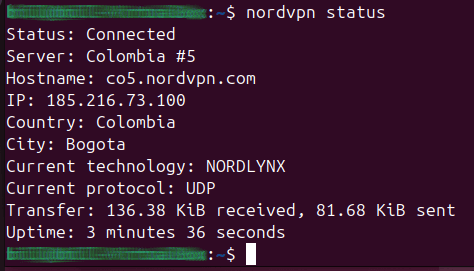
NordVPN’s network consists of 6,400+ servers distributed across 111 countries. Each of those servers runs in RAM-only mode, providing additional protection against attacks. In addition, NordVPN is upgrading its entire network to run on self-owned (colocated) servers and adding 10 Gbps connections where needed to prevent future bandwidth problems. If you need a good VPN with dedicated IP, check out our NordVPN Dedicated IP guide.
When it comes to price, you’ll want to consider a long-term investment in NordVPN. Their pricing is skewed heavily in favor of their multi-year subscriptions and with the two-year subscription it ranks as one of the best cheap VPN services.
All NordVPN subscriptions come with a 30-day money-back guarantee. There is also 24/7 live chat support if you need help getting anything set up.
+ Pros
- User-friendly and reliable apps
- Double VPN and Onion over VPN servers
- No logs (audited four times so far)
- Strong encryption standards with full support for WireGuard
- Works with Netflix and many other streaming services
- Threat Protection feature to block ads, trackers, and malware domains
- 24/7 live chat support
- Dedicated RAM-only with 10 Gbps bandwidth channels
– Cons
- No Linux GUI app
- Big discounts only available with long-term subscriptions
NordVPN’s Black Friday Deal is live:
Get 74% Off NordVPN with 2-year subscriptions plus 3 extra months:
(Coupon is applied automatically; 30 day money-back guarantee.)
See our NordVPN review for more info and test results.
Surfshark – Cheap and fast Linux VPN with GUI
| Website | Surfshark.com |
| Based in | The Netherlands |
| Logs | No logs (audited) |
| Price | $1.99/mo. |
| Support | 24/7 live chat |
| Refund | 30 days |
| Deal | 87% Off Coupon |
In most of our VPN reviews, Surfshark comes in at #2, right behind NordVPN. Surfshark is based in The Netherlands (one of the better jurisdictions for a VPN) and is an audited no-logs VPN service with a lot to offer. It has an excellent GUI for Ubuntu and Debian-based distros that makes controlling the VPN in Linux a point-and-click operation.
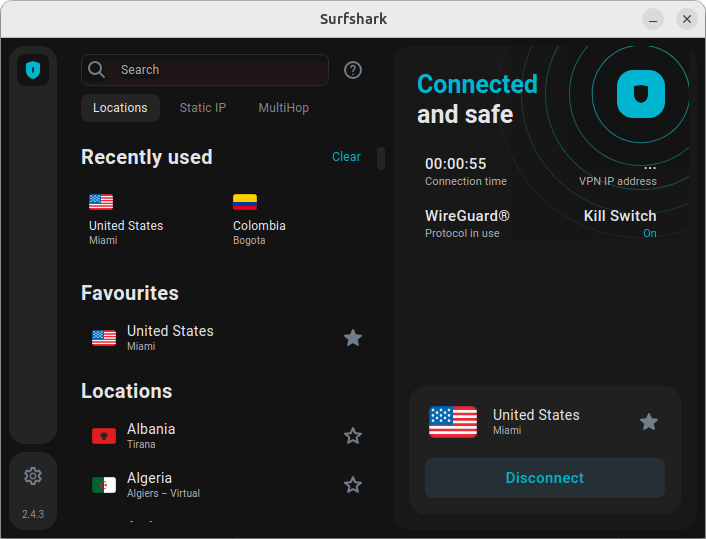
Note: There is also a Linux CLI version of the app for distros that cannot run the GUI version.
There are some other VPNs with a GUI, as we noted in the NordVPN vs Windscribe comparison, but they come with pros and cons, too.
Advanced Surfshark features
Like NordVPN, Surfshark has a large network (3,200+ RAM-only servers in 100 countries) that is rich in advanced security and privacy features. As you can see in the image above, The Surfshark Linux app supports WireGuard, making for fast, secure connections. For enhanced privacy, it too uses a double NAT system, and defaults to using WireGuard whenever you need the best performance. It is extremely fast, secure, and private, making it one of the best VPNs for gaming.
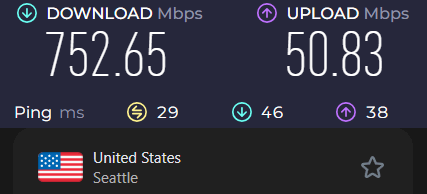
The Linux app includes important security features like Auto-connect and a kill switch. Going further, they offer a CleanWeb feature to block ads and trackers, MultiHop (double-VPN) and Static IP servers, and Camouflage mode (obfuscation) to get around VPN blocks. One feature the Linux version does not have is Surfshark’s WhiteLister, a split tunneling control. You can see some of these features in the screen capture below:
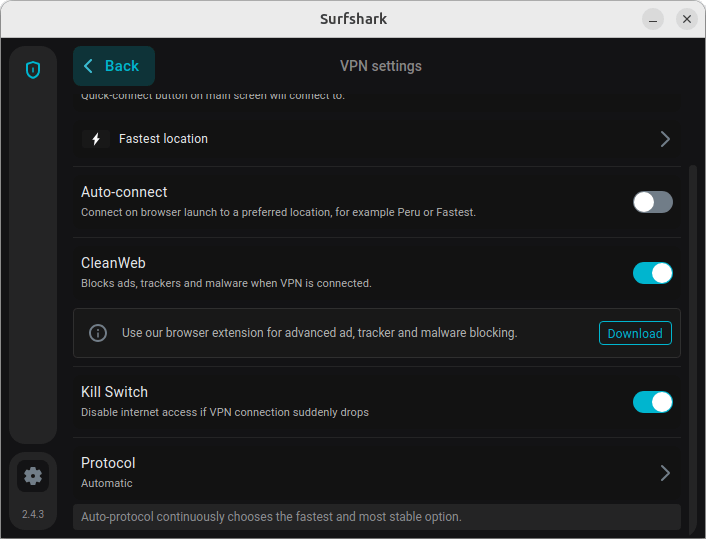
Surfshark is a great VPN for streaming, with access to 15+ different Netflix libraries, Hulu, Amazon Prime, and are one of the best VPNs for BBC iPlayer. They even offer a dedicated app if you want to use a VPN with Fire Stick. And unlike many services, which restrict or altogether block torrenting, Surfshark allows torrenting on all of their servers.
See all Surfshark VPN features here >
Surfshark also offers plenty of value at only $2.19 per month with the coupon below. Add in the fact that Surfshark supports an unlimited number of simultaneous connections, and it’s easy to see the value proposition. They also give you 24/7 live chat support along with a 30-day money-back guarantee on all plans.
Note: At the time of this review, the Surfshark Linux app was evolving rapidly but did not yet have all of the features that the Windows app did. By the time you read this, the app may well have features such as dynamic MultiHop and access to Dedicated IP servers.
+ Pros
- GUI for Linux
- Unlimited connections
- User-friendly apps for all devices and operating systems
- CleanWeb feature to block ads, trackers, and malware domains
- Works great with Netflix and many other streaming services
- 24/7 live chat support
- Strong encryption and leak protection features
– Cons
- Limited support for VPN routers
- Linux app doesn’t have all the features of the other desktop versions
Surfshark VPN Coupon:
Get 87% off Surfshark VPN plus an additional 4 months extra with the coupon below:
(Coupon is applied automatically; 30 day money-back guarantee)
See our review of Surfshark VPN for more info and test results.
ExpressVPN – A secure and reliable Linux VPN service
| Website | ExpressVPN.com |
| Based in | British Virgin Islands |
| Logs | No logs (audited) |
| Price | $6.67/mo. |
| Support | 24/7 live chat |
| Refund | 30 days |
| Deal | 49% Off Coupon |

ExpressVPN is another great VPN for Linux you may want to consider. Offering solid performance along with strong security and industry-leading access to streaming media services, ExpressVPN continues to impress across the board. It is based in the British Virgin Islands and is an audited no logs VPN.
ExpressVPN’s strong default security is built around an AES-256 cipher and a 4096-bit RSA key. Their support for the OpenVPN protocol extends to all their apps, including those for mobile devices. They have also released a self-developed VPN protocol called Lightway.
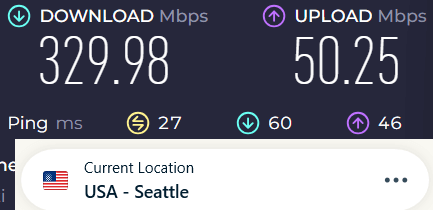
The Lightway protocol is similar to NordVPN’s NordLynx protocol, although not as fast. To prevent your personal data from leaking onto the Internet if the VPN connection fails, ExpressVPN apps have Network Lock, ExpressVPN’s kill switch to secure your traffic.
Security audits and more
ExpressVPN, like NordVPN, has had its no logs policy audited by third parties multiple times. They have also demonstrated their no-logs status in a conflict with a hostile nation.
In 2016, Turkish authorities seized an ExpressVPN server while investigating the assassination of the Russian Ambassador to Turkey. The authorities believed that the assassin had used the server, and conducted an extensive analysis of the device for logs that could be used to identify the perpetrator. However, the server contained no logs that could be used in the investigation. Since this incident, ExpressVPN has only increased user privacy thanks to their TrustedServer (RAM-disk) initiative and features like Threat Manager, which blocks trackers and malware.
Coming back to streaming media, we rate ExpressVPN as one of the best VPNs for Netflix. They give you access to many of the best Netflix regions on the planet.

But you won’t be limited to Netflix either. ExpressVPN’s streaming technology also works with Hulu, Disney Plus, Amazon Prime, and more. They provide thousands of servers in 105 countries that are optimized for streaming a huge variety of content. This streaming ability helps put ExpressVPN ahead of most Linux VPNs, even some that have Linux GUIs, as we saw in our ExpressVPN vs Mullvad VPN comparison.
While ExpressVPN is definitely a high-quality service, it does have some drawbacks. ExpressVPN does not offer as many features as we see with some of our other top Linux VPNs. It is also more expensive than competitors like NordVPN and Surfshark, but they do offer a coupon for three months free (below).
+ Pros
- User-friendly and secure apps
- Fast speeds throughout the server network
- Split tunneling feature (for Mac OS, Windows, and routers)
- Works with Netflix and most streaming services
- 24/7 live chat support
- Passed independent third-party audits for security and no-logs
- Very large server network
– Cons
- No Linux GUI
- Above-average prices
- Fewer features than some leading VPNs
ExpressVPN Coupon:
Sign up for the 12-month plan and get 3 months added to your subscription for free.
(Coupon is applied automatically.)
See our ExpressVPN review for more test results and analysis.
OVPN – Sophisticated VPN with a native Linux GUI app
| VPN | OVPN |
| Based in | Sweden |
| Logs | No logs |
| Price | $4.24/mo. |
| Support | Email & Chat |
| Refund | 10 days |
| Website | OVPN.com |
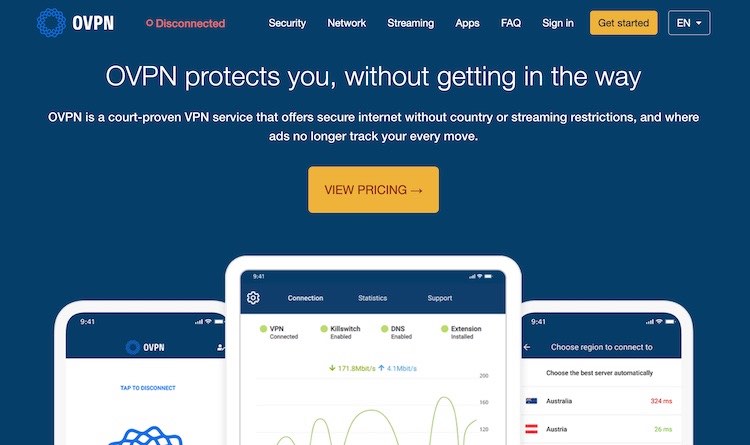
OVPN is a small, highly-focused VPN company dedicated to protecting your online privacy. The OVPN network offers a small number of highly secure, high-end VPN servers located in a select few data centers. They also provide a native Linux version of their desktop app.
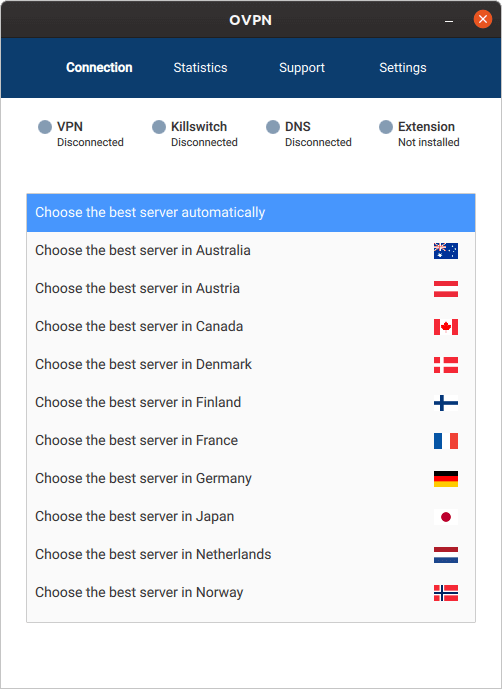
OVPN provides clients for many Linux distros. The desktop client is supported on some of them, while the CLI is supported on others. In some cases both are supported, giving you the option to decide how you want to control your VPN.
With all of the possibilities, it is good to see that OVPN has provided installation and configuration options for all the various possibilities.
Designed for maximum user privacy
OVPN is designed to provide maximum user privacy. It is a no logs VPN service, running on diskless servers. While the service has not conducted a no logs third-party audit, they instead successfully defended their no logs policy in court. The situation is a bit confusing, so if you want to learn more, we refer you to the OVPN blog post on the case.
The entire OVPN system is built on a seven-layer cybersecurity model, which addresses everything from the physical security of the server locations to insurance that covers the cost of defending against third-party requests for OVPN user data.
Serious DNS leak protection
OVPN finds any available network adapters on your device and automatically redirects them through the VPN tunnel to the OVPN DNS servers to protect against DNS leaks. It also monitors the DNS settings on every network adapter to ensure that other software doesn’t change the DNS servers, while their DNSCrypt support protects against DNS spoofing attacks.
+ Pros
- Linux clients for Ubuntu and other Linux distros
- Designed for maximum user privacy and security
- Strong protection against DNS leaks
- Streaming and torrenting supported
- Highly configurable
- Multiple payment methods
+ Cons
- Small number of server locations
- Above average prices with a short refund policy
You can learn more about this VPN provider in this full OVPN review.
Do you need a VPN for Linux?
As a Linux user, you are already several steps ahead of the pack when it comes to security and privacy. But you do need a VPN for Linux. Here’s why:
You need the protection a Linux VPN service can provide
No matter how secure your Linux distro is, and what additional steps you take to armor your system against viruses and malware, a standard Internet connection offers very little protection against today’s threats.
Whether it is your ISP (Internet Service Provider), hackers, foreign spies, or your own government, there is a literal horde of people trying to extract personal information from your Internet connection. Your computer can’t protect you against these attacks. Only a VPN can do that.
How a VPN protects you
A VPN (Virtual Private Network) provides both security and privacy for your interactions with the rest of the world. A VPN creates an encrypted connection from your device to its servers. This encrypted connection is called a tunnel. The strong encryption applied by the VPN client gives you security because it makes it impossible for anyone spying on the tunnel to gather any useful information. Unless they can break the encryption, all they will see is gibberish.
A VPN provides privacy by hiding information (your IP address) that could be used to identify your device or your physical location. Only the VPN service knows your real IP address, which is why using a no-logs Linux VPN is so important. Without logs, it becomes impossible for anyone to know where you have gone and what you have been doing while connected to the VPN.
A VPN’s ability to replace your IP address with one of its own is key for access to content that would otherwise be inaccessible from your physical location. This is why it is good to use a VPN with servers located in many countries around the world.
Some VPNs also offer ad blocking, such as we saw in our NordVPN vs Proton VPN comparison. While there are benefits to using a VPN with ad blocking, only a few services offer this feature in their Linux apps.
What can your ISP see if you don’t use a VPN for Linux?
Unless you take steps to protect your Internet connection, your ISP or mobile carrier will be able to log every website you visit. This can be disastrous if you live in a country that wants to control what you see and do online. Visiting the wrong website from the wrong country could result in your name showing up on some government list of troublemakers, or even a visit from local authorities.
Note: We have an in-depth report that details how internet service providers are logging everything you do online, and then sharing this data with a network of third parties. The solution of course is to use a VPN whenever you go online.
Why you don’t want your ISP to track you
Even if the knowledge of where you go online doesn’t result in a threat to your life and liberty, it can still lead to some unpleasant stuff. Many countries require local ISPs to keep records of everything you do online for months or even years. Why?
They just want it in case they decide they need that information later. As much of the world descends into a nightmare of surveillance and control, the idea that your past internet activity could be held against you by some future government should scare you. Every time you go online, you are being watched. Protect yourself accordingly with a good VPN and other privacy tools.

Meanwhile in the USA, Internet Service Providers have the legal right to log whatever data about your online activities they can, then sell it. To whom can they sell it? Apparently to anyone they want, without even asking your permission.
How long has this been going on? Legally, since 2017. But it would be no surprise if it has been going on for far longer than that. (We cover these issues more in our guide on the best VPNs for USA.)
They spy on your DNS requests
One way an ISP can find out which sites you visit is by looking at your DNS requests. DNS is the system that translates human-readable Internet addresses (www.RestorePrivacy.com) into computer-readable Internet addresses (IP addresses, which look something like this: 45.79.181.19). When you use a typical ISP, they control your access to DNS. When your device sends a request to the DNS, the ISP logs that address, giving them a complete record of the sites you visit.
All of our recommended Linux VPN services encrypt DNS requests before your ISP can see them. VPNs send these requests to their own secure and private DNS servers. The results of the DNS request return to your device through the encrypted VPN tunnel, so your ISP can’t see them either. The result is that the ISP is completely blocked from seeing where you go.
Are VPNs for Linux legal?
VPNs are legal almost everywhere in the world. Businesses, in particular, rely on them every day to securely interconnect physical locations without the need to build physical infrastructure. Individuals use VPNs to protect online banking and other private activities. Even in repressive countries like China, VPN services are legal for basic privacy (but not to circumvent censorship efforts).
Limits on VPN legality
But you don’t have a completely free hand to use a VPN in some parts of the world. Referring to China again, while VPNs are legal there, not all VPNs are legal there. The country has banned VPN services that do not follow the government’s extensive censorship guidelines and receive official government approval to operate. See our best VPN for China guide if this is a concern to you.
Russia also tries to force VPN services to work with their state censors. Our best VPN for Russia guide has more on this. A few other repressive countries (mostly in the Persian Gulf region) have laws that explicitly ban using a VPN to evade their local censors.
Beyond that, VPNs are safe and legal to use throughout the world, but if in doubt, be sure to double-check your own laws.
Note: We are researchers, not lawyers, so treat this as simply our opinion, not legal advice.
Is it safe to use a VPN for Linux?
The best Linux VPN services are indeed safe to use.
At least that’s so for normal circumstances. If your use case involves hacking the NSA or something equally insane, you cannot expect even the best VPN service to protect you.
Tip: See our guide on how to be anonymous online.
Why you should avoid VPNs based in your own country
Using a VPN service based in a different country is a smart move. When it comes to what people are up to online, countries are naturally most interested in the activities of their own citizens. And VPN services are required to obey the laws of the country they are based in. Put those two facts together and you’ll understand why you don’t want to use a VPN based in your country.
An example of why this is important
Let’s say you are a citizen of Country A and the government of Country A wants information about your online activities. If you are using a VPN based in Country A, it will be relatively easy for the government to demand information on you.
If you are using a VPN based in Country B, it becomes much harder for the government of Country A to get the information they want. The VPN is controlled by the laws of Country B. Country A would need to persuade Country B to get the VPN to send over the data.
While getting data about you from a VPN in a different country is certainly possible, it isn’t particularly practical, making it safer to use a VPN based in a different country.
How do I set up a VPN for Ubuntu and other Linux distros?
Ubuntu and Ubuntu-based distributions remain the most popular for Linux. Fortunately, it is easy to set up a VPN for Ubuntu. Depending on the VPN you are using, the exact instructions will vary. Due to the popularity of Ubuntu, however, many services give specific instructions for setting up an Ubuntu VPN.
This could be hard
Setting up a VPN for Linux can be harder than setting up one on other operating systems. That’s because not all of the top VPNs for Linux have a simple app with a Graphical User Interface (GUI) like you find on their Windows or Android apps. For many Linux VPNs, you are stuck with a bunch of command-line interfaces (CLI) that work in the Linux terminal. The process goes something like this:
- Download the VPN’s CLI app for your Linux distro.
- Find the VPN app file in your Downloads folder and double-click it.
- Log into the terminal.
- Follow the CLI instructions provided on the VPN’s website to install and configure the app.
- Activate the VPN using the command-line instructions given on the website.
- You will typically need to run a terminal command like, “sudo expressvpn status” to confirm that the VPN is connected and active.
However, if you go with one of our top picks, the setup can be relatively simple. And all of our recommended Linux VPNs have setup guides and/or videos.
Linux VPNs for international TV and sports
Geo-blocking is a technique that streaming content providers use to control the geographic regions where their content can be viewed. While those streaming content providers have contractual reasons for geo-blocking their content, you may want or need access to content that you are blocked from in your current location.
Geo-blocking systems use your IP address to decide whether or not to give you access to the content. This is great for us since one function of a VPN is to hide your actual IP address from the world. They do so by substituting the IP address of the VPN server you are using for your actual IP address. In other words, if you are in Berlin, and your connection is to a VPN server in New York, it will look to the world as if you are in New York (the United States) instead of Berlin (Germany).
Now imagine you want to connect to your US Netflix account, but you are currently in Berlin. If you try to connect normally, Netflix will block you. But if you connect to that VPN server in New Jersey, Netflix will think you are in the United States and give you access. Of course, you’ll still need to have your account so you can log on, but you will have the access you need, and not be blocked because you happen to be somewhere else at the moment. The same concept applies to other streaming services, as well as sporting events.
Content providers are wise to this use of VPNs, so many of them put great effort into blocking VPN servers from connecting. If streaming content from various regions of the world is a goal of yours, you will definitely want to check out our guide to the best VPNs for streaming in general, as well as our guides to streaming content from Netflix, Amazon Prime, BBC iPlayer, Disney Plus, and Hulu.
Another use of the location-shifting ability of your Linux VPN is to watch sports and other content that is not available in your current location. You could connect to a server in the opponent’s country and watch the soccer match from the perspective of the visitors instead of your home team. Or you could log into a Mexican server and watch soap operas in Spanish to help you learn the language.
Used creatively, the best VPNs for Linux can turn you into a virtual world traveler, something we all took advantage of during the COVID lockdowns.
Conclusion: Use a good VPN for Linux in 2024
Today we discussed the best VPNs for Linux. Our top 4 picks can restore your privacy and security online. With the increasing prevalence of security issues and hackers exploiting vulnerabilities, opting for a reliable VPN is becoming the only choice for Linux users.
Choosing your best VPN for Linux isn’t a decision to be taken lightly. In this article, we’ve summarized the key features of our top 4 Linux VPNs, and given you links to their in-depth reviews for our comprehensive analysis and test results. Protecting your systems with one of these VPNs will significantly increase your online privacy and security.
Remember that all of our recommended Linux VPNs offer a money-back guarantee and give you anywhere from 7 to 30 days to evaluate their service, without risk.
We are optimistic that by the time you are done, you will have found a great Linux VPN for your unique needs.
Frequently Asked Questions
Here are some of the most frequently-asked questions about Linux VPNs:
Are Linux VPNs legal?
Using a VPN is legal in most countries on Earth. And the operating system you use doesn’t matter: Windows, Linux, iOS, it is all the same. However, using a VPN to do something illegal is still illegal.
Is it safe to use a VPN on Linux?
If you use a quality VPN like those covered in this article, it is indeed safe. There are many fake VPN services that could cause you problems, but if you stick to the ones we recommend it is definitely safe.
How do I set up a VPN for Linux?
This question does not have a simple answer. Since most Linux VPNs do not come with installers, you will probably have to execute a series of instructions using the Linux Command Line Interface (CLI). Consult the website of the VPN you are interested in for additional details.
This Linux VPN guide was last updated on July 30, 2024.

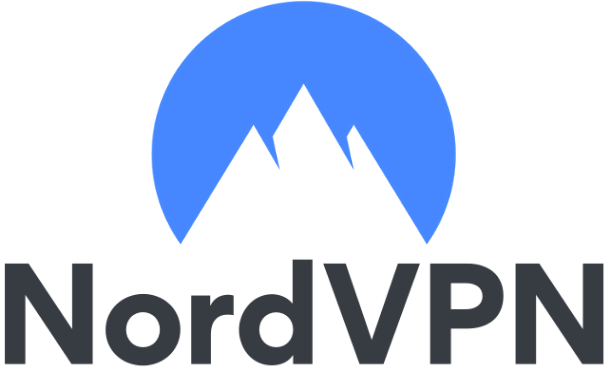

VPN companies with a GUI APP for Linux users
:
:
Air – Italy – https://airvpn.org/linux
Astrill – Liechtenstein – https://www.astrill.com/wiki/Astrill_Setup_Manual:Linux
:
Ivpn – Gibraltar – https://www.ivpn.net/en/apps-linux
Mullvad – Sweden – https://mullvad.net/en/help/install-mullvad-app-linux
Ovpn – Sweden – https://www.ovpn.com/en/guides
:
Proton – Switzerland – https://protonvpn.com/support/linux-vpn-setup
Pure – British Virgin Islands – https://support.purevpn.com/en_US/linux
:
Surfshark – Netherlands
https://support.surfshark.com/hc/en-us/articles/5067279648146-How-to-set-up-Surfshark-on-Linux
:
Vpn.ac – Romania – https://vpn.ac/knowledgebase/114/Linux-VPN-client-app.html
:
:
Mozilla – USA
https://support.mozilla.org/en-US/kb/how-install-mozilla-vpn-linux-computer
:
Private Internet Access – USA
https://helpdesk.privateinternetaccess.com/guides/linux/linux-installing-the-pia-app#linux-installing-the-pia-app_step-2-run-installer
:
Torguard – USA – https://torguard.net/support
Vpn Unlimited – USA – https://www.vpnunlimited.com/help/manuals/linux
:
Windscribe – Canada
https://windscribe.com/knowledge-base/articles/how-to-set-up-windscribe-on-linux
:
:
I am not sponsored by any companies.
I simply enjoy helping others and wanted to share with you vpn providers that
offer a GUI APP for easy usability vs Terminal Command Line and Web Browsers Extensions.
:
:
If you are in need of help, do not be shy to ask questions : )
Are you sure Vpn.ac has a GUI? They have an app, but the last time I used it ehere was no GUI, and I can’t see anything on their site saying they have introduced one.
I am currently running Linux Mint 22 Cinnamon on my laptop.
https://postimg.cc/SXvSBGD9
:
[url=https://postimg.cc/SXvSBGD9][img]https://i.postimg.cc/SXvSBGD9/Screenshot-from-2024-08-28-21-03-07.png[/img][/url]
:
https://vpn.ac/knowledgebase/114/Linux-VPN-client-app.html
VPN.AC has a GUI for Debian, Mint, Ubuntu.
Yes, I am sure.
https://postimg.cc/KKvCGCJW
https://i.postimg.cc/XvwW8bFn/Screenshot-from-2024-08-29-18-58-57.png
I am currently using Linux Mint 22, Cinnamon
and I was able to download and install the app with no issues.
:
IMPORTANT NOTES:
:
– the app is currently available for 64 bit
Debian based distros only, tested with Ubuntu, Mint, Debian distributions
:
– “net-tools” package is a pre-requisites, on Debian-based distros
install it by running ‘sudo apt-get install net-tools -y’
:
https://vpn.ac/knowledgebase/114/Linux-VPN-client-app.html
Vpn companies with a GUI app for Linux users
–
–
Air vpn – Italy
Astrill vpn – Liechtenstein
ivpn – Gibraltar
Mullvad – Sweden
Ovpn – Sweden
–
–
Proton vpn – Switzerland
Pure vpn – British Virgin Islands
Surfshark – Netherlands
Vpn . ac – Romania
Vpn area – Bulgaria
–
–
Mozilla vpn – USA
Private Internet Access – USA
Torguard – USA
Vpn unlimited – USA
Windscribe – Canada
–
–
Updated March 13, 2024
+1 vote for Aeroshield VPN [https://aeroshield.me/] for Linux
This article asserts, “As of right now, if you want to take advantage of what VPN.ac offers on Linux machines, you’ll need to do so using a stand-alone OpenVPN client connected to the VPN.ac network using the Linux Network Manager tool.”
Note that VPN.ac also supports WireGuard on some Linux distros using Network Manager…
https://vpn.ac/knowledgebase/133/WireGuard-on-Linux-using-Network-Manager.html
Another vote for Mullvad here.
A very underrated VPN.
Fully featured GUI including split tunneling.
These guys take security & privacy seriously (check out their own browser).
Mullvad secure all my Linux machines.
Mullvad is nearly perfect for Ubuntu! It can block the net by kill-switch and start on boot, which means there will be absolutely no IP leak after the first VPNconnection is made. And it is a GUI client!
Mullvad can start on boot without root password.
airVPN on Linux??
Astrill Vpn has a Linux GUI.
However, their prices are very expensive.
Surfshark’s linux app is now gui. Runs on ubuntu or debian, not fedora or red hat.
https://surfshark.com/download/linux
Vpn providers with a GUI for Linux users
:
:
:
Airvpn – Italy
Ivpn – Gibraltar
:
Mullvad – Sweden
Opvn – Sweden
:
Protonvpn – Switzerland
Wevpn – British Virgin Islands
:
Pia – USA
Torguard – USA
Vpnunlimited – USA
Windscribe – Canada
:
:
:
A friendly reminder that
even though you are currently
using a vpn or might do so in the next few days,
I recommend that you visit the privacy guides on this
website so that your computers and phones are more secured
You can just go ahead and scratch ExpressVPN off this list. It’s bloated and unbearable on Ubuntu. Mullvad was always too slow for me, which was a dealbreaker to those commenting about it, just my two cents. I have since made the switch to Nord and everything works well. Oh and Wireguard is insanely fast, much faster than Wireguard with Mullvad, for whatever reason. Yes, I tried lots of servers. I’m staying with Nord for now, I don’t care about streaming, only performance and security.